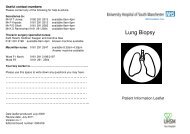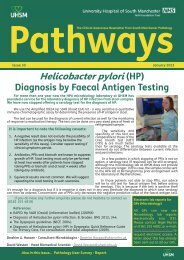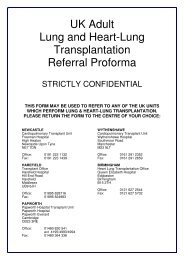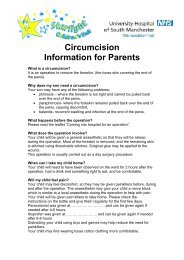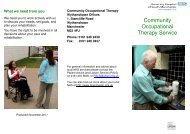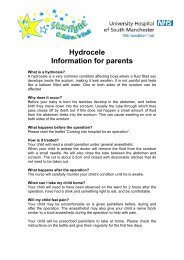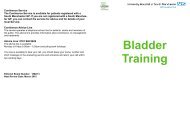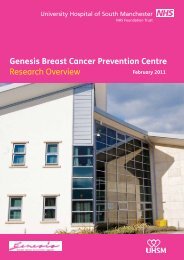Drug Allergy – the facts - Anaphylaxis Campaign
Drug Allergy – the facts - Anaphylaxis Campaign
Drug Allergy – the facts - Anaphylaxis Campaign
Create successful ePaper yourself
Turn your PDF publications into a flip-book with our unique Google optimized e-Paper software.
Since reactions are generally mild and dose-related, such challenges with paracetamol can safely be carried<br />
out in a primary care or outpatient department, unless <strong>the</strong> NSAID reaction has been particularly severe.<br />
Doses of 250, 500 and 1000 mg at two-hourly intervals would be appropriate for most such patients.<br />
For people who react to paracetamol, codeine-based painkillers are often well tolerated. Caution in reading<br />
labels and asking advice from a pharmacist are both essential. Bear in mind that aspirin is sometimes named<br />
only as acetylsalicylic acid.<br />
Anti-hypertensives<br />
Many different types of drug are used nowadays in <strong>the</strong> treatment of high blood pressure, some of which can<br />
cause anaphylactoid reactions, but true allergic sensitivity to such drugs is rare. In those with a predisposition<br />
to asthma, <strong>the</strong> beta-blockers are likely to precipitate bronchoconstriction, and should be avoided.<br />
ACE inhibitors, whose names generally end in ‘-pril’, can produce an anaphylactoid response such as a dry<br />
cough or angio-oedema, particularly if <strong>the</strong> swelling affects <strong>the</strong> lips, tongue and lower half of <strong>the</strong> face. Since<br />
<strong>the</strong> patient may tolerate <strong>the</strong> drug for months or even years before this problem arises and because it can be<br />
episodic, in spite of continuing treatment, it may not occur to <strong>the</strong> patient or <strong>the</strong>ir doctor that it is <strong>the</strong> ACE<br />
inhibitor that is to blame.<br />
As ACE inhibitors can cause severe life-threatening airway obstruction, an urgent review of <strong>the</strong> antihypertensive<br />
treatment regimen is required in any person who has experienced angio-oedema. ACE<br />
inhibitors should not be taken, for any cause, by anyone who has experienced angio-oedema, even if <strong>the</strong><br />
angio-oedema was triggered by something o<strong>the</strong>r than an ACE inhibitor.<br />
General anaes<strong>the</strong>sia<br />
<strong>Drug</strong>s used in general anaes<strong>the</strong>sia pose a particularly difficult problem, since <strong>the</strong> patient is generally asleep<br />
when <strong>the</strong> reactions start and recognition depends on <strong>the</strong> anaes<strong>the</strong>tist observing such symptoms as falling<br />
blood pressure, airway obstruction, etc., ra<strong>the</strong>r than symptoms reported by <strong>the</strong> patient. Fortunately,<br />
sensitivity to drugs used in general anaes<strong>the</strong>sia is rare, but because such drugs are injected directly into <strong>the</strong><br />
bloodstream, symptoms may be severe and rapid in onset and progression.<br />
Identifying <strong>the</strong> cause<br />
It is common for several drugs to be given toge<strong>the</strong>r, or in quick succession, at <strong>the</strong> induction of general<br />
anaes<strong>the</strong>sia; <strong>the</strong>se include induction agents (to render <strong>the</strong> patient unconscious), neuromuscular blockers (to<br />
paralyse <strong>the</strong> patient temporarily, to facilitate airway intubation and <strong>the</strong> surgical procedure), antibiotics,<br />
painkillers and blood or plasma substitute infusions. Any one of <strong>the</strong>se drugs may be implicated in<br />
anaphylactic or anaphylactoid reactions during anaes<strong>the</strong>sia. It is important to identify which agent was<br />
responsible and which alternatives are likely to be safe to use in future.<br />
Referral to a centre with experience of anaes<strong>the</strong>tic-related reactions is important and this should be <strong>the</strong><br />
responsibility of <strong>the</strong> anaes<strong>the</strong>tist who was present. Skin prick testing is a useful part of <strong>the</strong> investigative<br />
<strong>Drug</strong> <strong>Allergy</strong> Factsheet<br />
Document Reference ACFS3<br />
©The <strong>Anaphylaxis</strong> <strong>Campaign</strong> 2011 5






